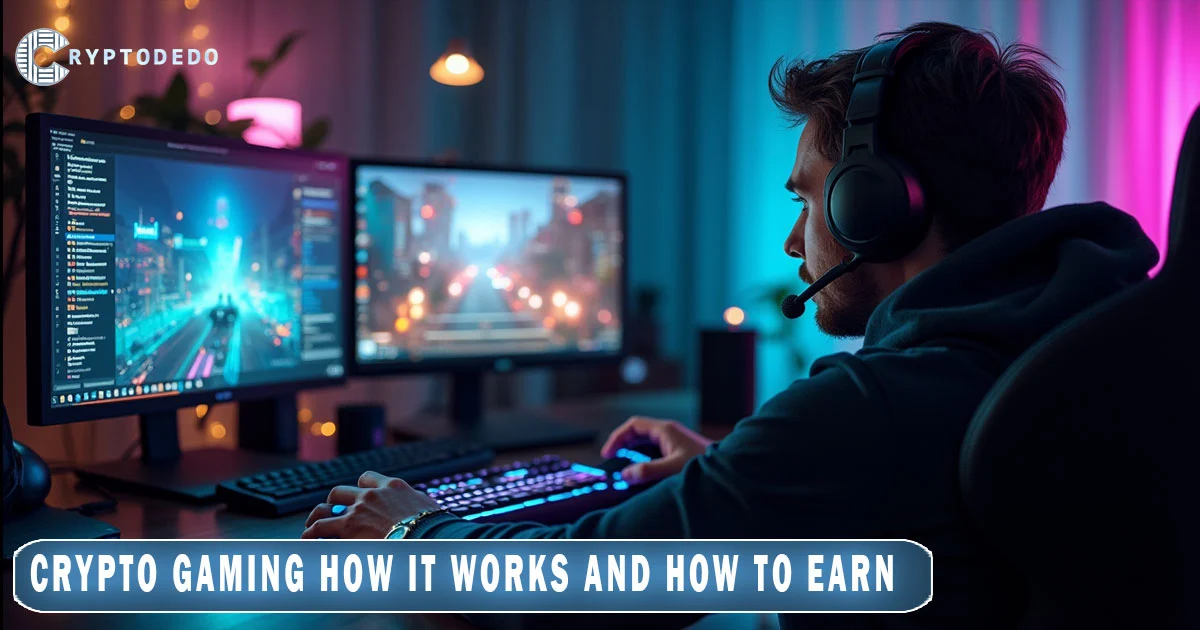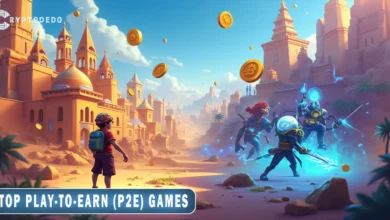Crypto Gaming: How It Works and How Players Earn Money
Crypto Gaming Platforms You Should Know: A Complete Overview

Crypto Gaming for Beginners: How to Earn Crypto While Playing
The gaming industry has evolved rapidly with the advent of blockchain technology and cryptocurrencies, leading to a new wave of digital experiences known as crypto gaming.
These games provide not only entertainment but also opportunities for players to earn real-world money through in-game actions.
Unlike traditional gaming, where players’ efforts and achievements are confined to the game, crypto games allow players to monetize their in-game assets and skills. This article explores how players can earn money through crypto gaming and the technologies that power this revolution.
Understanding Crypto Gaming
Crypto gaming, also known as blockchain gaming, incorporates blockchain technology into video games, allowing players to own digital assets such as in-game items, currencies, and characters as NFTs (Non-Fungible Tokens).
These assets are stored on a decentralized ledger (the blockchain), ensuring that players truly own them and can trade, sell, or rent them as they wish.
Many crypto games operate on a Play-to-Earn (P2E) model, where players are rewarded with cryptocurrencies or NFTs for completing in-game activities. These assets can be converted into real money, giving players the opportunity to generate income while playing.
Reward Potential: Crypto Gaming vs Traditional Gaming
Financial Rewards
Traditional Gaming: Players rarely earn any real financial rewards. Even professional gamers and streamers who earn money from traditional gaming are a minority, and income streams like prize money or sponsorships are reserved for the elite.
Crypto Gaming: Financial rewards are more accessible to a broader range of players. Many P2E games allow players to start earning from day one. The ability to sell NFTs or trade tokens for real-world money is a significant advantage over traditional gaming.
How Players Earn Money in Crypto Games
Players can earn money through various methods in crypto games, each offering unique ways to generate revenue.
1. Play-to-Earn (P2E) Model
The Play-to-Earn model allows players to earn cryptocurrency or NFTs by completing tasks, winning battles, or participating in events. The more a player engages with the game, the more rewards they can accumulate. These rewards can then be converted into real-world value.
Example:
Axie Infinity: One of the most well-known P2E games, Axie Infinity allows players to battle their Axies (in-game characters) and earn Smooth Love Potion (SLP) tokens. Players can sell these tokens on cryptocurrency exchanges for real money, making the game a lucrative opportunity for dedicated players.
The Sandbox: In this virtual world, players can create and sell digital assets such as land, avatars, or structures. These assets are represented as NFTs and can be traded on marketplaces like OpenSea for cryptocurrency.
2. Selling NFTs
Many in-game items in crypto games are represented as NFTs, which are unique digital assets stored on the blockchain. Players can earn rare NFTs during gameplay or buy them through the game’s marketplace.
These NFTs can then be sold on external platforms like OpenSea, Rarible, or Magic Eden, allowing players to earn real cryptocurrency.
Example:
A player might acquire a rare sword or character skin in a game. Since the item is an NFT, the player can list it for sale on a marketplace. Depending on its rarity and demand, the NFT could be sold for a substantial amount of cryptocurrency like Ethereum (ETH) or Solana (SOL), which can then be converted into fiat money.
3. Staking and Yield Farming
Many crypto games feature a staking or yield farming system, where players can lock up a game’s native token or provide liquidity to a decentralized finance (DeFi) system within the game. In exchange, players earn rewards such as additional tokens or interest on their holdings, which can be reinvested or cashed out.
Example:
Illuvium: Players can stake ILV, the native token of Illuvium, and earn rewards over time. These staking rewards can be traded on exchanges or used within the game to enhance gameplay.
4. Tournaments and Competitions
Competitive gaming has always been a major part of the gaming ecosystem, and in crypto games, players can earn substantial rewards through tournaments and eSports competitions. Many crypto games organize these events, offering prize pools in the form of cryptocurrency or rare NFTs.
Example:
Gods Unchained: Players participate in ranked matches and tournaments, with top performers rewarded with valuable NFT cards or cryptocurrency. These rewards can either be used to enhance their game experience or sold on external markets for profit.
5. Renting NFTs
Some players in crypto games prefer to rent valuable NFTs rather than buy them outright. This creates an opportunity for players who own rare or powerful assets to rent them out for passive income.
For example, if a player owns a powerful character or a rare item, they can lease it to other players for a set period in exchange for a share of the in-game rewards.
Example:
In Axie Infinity, players who own rare Axies can rent them to other players who may not be able to afford their own. The renter uses the Axie in battles to earn rewards, and the owner takes a portion of the earnings as rental income.
How Players Get Paid in Crypto Games
Once players have earned cryptocurrency or NFTs, they can withdraw or convert their earnings using several methods. Here’s how the process works:
1. Selling NFTs on Marketplaces
NFTs earned in the game can be sold on popular marketplaces like OpenSea, Rarible, or Magic Eden. When a player lists an NFT and it gets purchased, they receive payment in cryptocurrency, such as Ethereum or Solana. This cryptocurrency can then be withdrawn to a personal wallet like MetaMask or Trust Wallet.
2. Converting Cryptocurrency to Fiat Money
After players accumulate cryptocurrency in the game, they can transfer it to their wallets. From there, they can send the cryptocurrency to the best crypto exchanges like Binance, Coinbase, or Kraken, where they can convert it into fiat money (USD, EUR, etc.) and transfer it to their bank accounts.
3. Using Decentralized Exchanges (DEXs)
For those who prefer decentralized exchanges, platforms like Uniswap or PancakeSwap allow players to trade in-game tokens for other cryptocurrencies.
These peer-to-peer trades offer more flexibility and eliminate the need for centralized services. Players can swap their earned tokens for more liquid cryptocurrencies like Ethereum (ETH) or Bitcoin (BTC), which can later be converted to fiat money if desired.
Platforms for Building and Running Crypto Games
Crypto games are built and operated on blockchain platforms that support NFTs and smart contracts. Some of the most popular blockchain networks for crypto gaming include:
Ethereum: Ethereum’s smart contract capabilities and its large developer community make it a go-to platform for many crypto games, despite its higher gas fees.
Binance Smart Chain (BSC): Known for lower fees and faster transaction speeds compared to Ethereum, BSC has become a popular alternative for many blockchain-based games.
Polygon: As a Layer 2 solution for Ethereum, Polygon offers faster and cheaper transactions, making it ideal for games with frequent microtransactions.
Solana: Solana is gaining popularity due to its high throughput and low fees, making it a strong contender for hosting large-scale games that require fast processing times.
Conclusion
Crypto gaming is transforming the way players interact with virtual worlds by giving them real ownership of in-game assets and enabling them to earn money through various methods like the Play-to-Earn model, NFT trading, staking, and participating in tournaments.
Payments are typically made in cryptocurrencies, which can easily be converted to fiat money via exchanges. As blockchain technology continues to advance, crypto gaming will likely evolve even further, offering new and innovative ways for players to monetize their gaming experiences.




